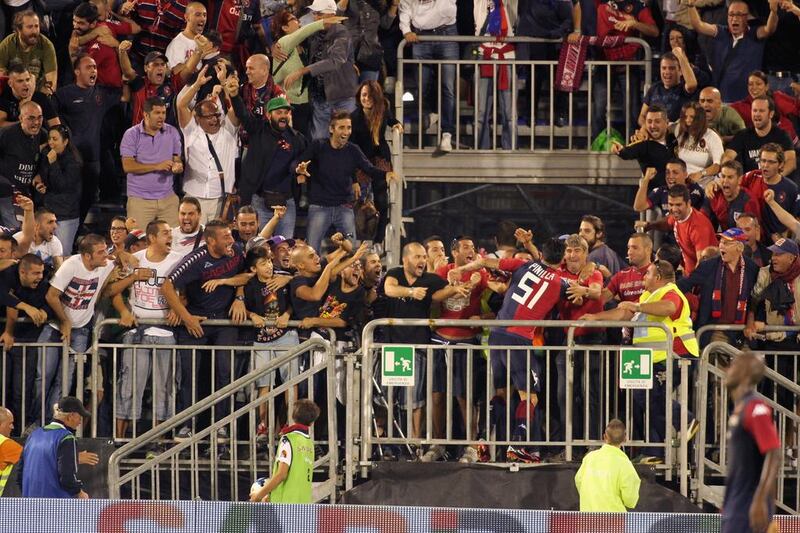Intrigue has been a constant companion at Cagliari for much of the presidency of Massimo Cellino, the controversial club owner whose search for a new project has now taken him to Leeds United.
In the English county of Yorkshire, suspicion greets Cellino’s prospective purchase of Leeds, the Championship club. In Sardinia, a mixture of nervousness and excitement builds at what might be in store next for Cagliari once Cellino bids farewell.
A win would be welcome, for a start. Cagliari have taken just four points from their past six Serie A matches, which makes the visit on Sunday to the Sant’Elia by Livorno a scrap between strugglers: 18th-placed Livorno versus 15th-placed Cagliari.
The fixture is overshadowed by boardroom manoeuvring. Believe the speculation, some of it directly fuelled by Cellino, and these two clubs could soon be representing very different poles of Italian football culture.
Livorno have long been proudly associated with their port city’s political history as the birthplace of Italian communism, which is why their fans still carry left-wing paraphernalia to games.
Under Cellino, Cagliari have been associated, as much as anything, with their lack of locale: they have shifted stadiums numerous times in the past four seasons. That they may soon become Italy’s third top-flight club under foreign control is considerably more interesting.
The royal family of Qatar has been in talks about Cellino’s proposed sale, and any mention of Qatari interest is bound to stimulate a degree of supporter enthusiasm.
The transformation of Paris Saint-Germain since the Qatar Sports Investment sovereign fund took a majority share in the French club is widely envied, particularly in Italy, to where PSG’s extravagant transfer fees have been channelled consistently: witness the swoops on AC Milan for Thiago Silva and Zlatan Ibrahimovic, on Napoli for Edinson Cavani and Ezequiel Lavezzi.
Serie A feels increasingly aware that to keep up with the other major European leagues, it may need to become more open to overseas investment in its clubs.
Roma are thriving under their US-based controllers, while Inter Milan are now part of the sporting portfolio of the Indonesian billionaire Erick Thohir. But Arabian Gulf patronage, of the type that has so uplifted Manchester City and PSG, is visible in Serie A only via shirt sponsorship and other advertising.
Cellino values Cagliari at around €50 million (Dh251.5m), a relatively modest price for a foothold in one of the sport’s top leagues, and potential access to the Champions League.
Could Cagliari realistically achieve that in, say, the next two years? With substantial investment in players, yes. Squeezing into the top three of the Italian top flight, and therefore Uefa Champions League contention, has been possible, recently, for a club like Udinese, so why not Sardinia’s finest?
The downside for a new owner would be the problems Cellino encountered and, with his often explosive temper, exacerbated. His chequered history as Cagliari president includes his arrest, a year ago, on charges of embezzlement, one chapter in a saga over stadium development that saw the club playing home games away from the Sant’Elia, over whose redevelopment Cellino clashed with the local authorities.
Cagliari temporarily relocated to the nearby Is Arena and, bizarrely, at one stage, to Trieste, in the north-east corner of the Italian mainland, an absurdly long trip for travelling fans.
Cellino, whose proposed takeover of Leeds has already included the dismissal and reinstatement of Brian McDermott, the manager, will always be regarded in a mixed light at Cagliari.
Anticipating his departure after 22 years at the club’s helm, he described himself, to Corriere della Sera as “a romantic, dreaming the impossible”. Whoever succeeds him will find a number of fans also dream the impossible, long to see the club back near the summit they reached in 1970, as Italy’s champions; or at least recreate the thrill generated by their Uefa Cup run, to the semi-finals, of 20 seasons ago.
Should Qatar’s royal family add the island’s main football club to their various Sardinian interests – including a string of properties around the Esmeralda coast, a luxury tourist destination – the rest of football would certainly take note of the growing Qarati footprint on the sport.
Not only are PSG controlled by the country that will host the 2022 World Cup, but Qatari money is behind Malaga, of Spain’s Primera Liga.
Under Sheikh Abdullah Al Thani, Malaga last season progressed to the Champions League knockout phase, though the running of that club has not always been smooth under his ownership. Cagliari looks like a project more on the Malaga scale than one of metropolitan PSG’s dimensions. Whatever it turns into, Cellino’s era has accustomed the club’s followers to fasten their seat belts.
sports@thenational.ae






